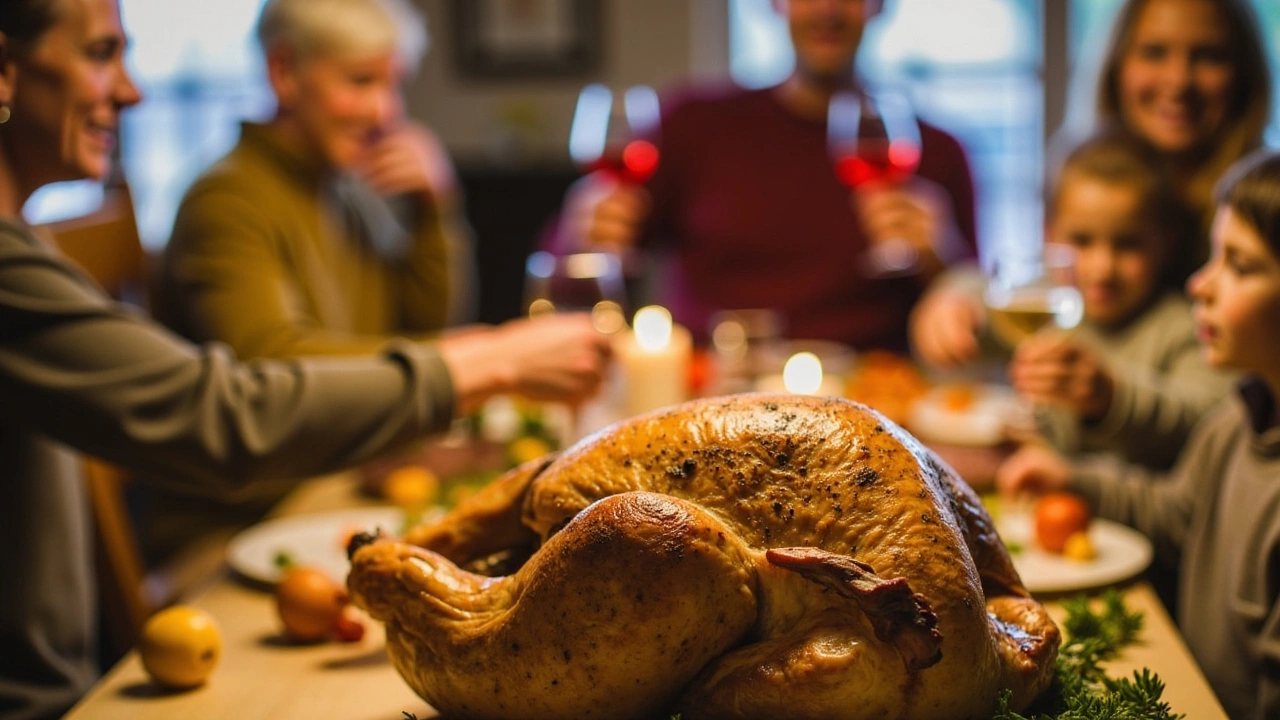Thanksgiving 2024 Store Hours: What's Open and What's Closed Amidst Changing Trends

Thanksgiving Day 2024: A New Retail Landscape
Thanksgiving Day has traditionally been a time for family gatherings, cozy meals, and reflections on gratitude. However, in the past few decades, it also marked the unofficial start of the holiday shopping season, with many retailers jumping the gun on Black Friday sales right as the turkey is being carved. But as 2024 approaches, a noteworthy shift is occurring, with a growing number of major retailers opting to remain closed, effectively putting the brakes on the pre-Black Friday rush. This change is more than just a scheduling adjustment; it reflects broader social dynamics and a reshaping of consumer culture.
For years, it seemed that retail giants raced to open their doors earlier and earlier, spurred by competition and the lure of the holiday spending frenzy. Yet in recent years, there's been a pushback against this trend. Many companies cite the importance of giving their employees time to spend with family, while others have acknowledged a growing consumer desire for a more traditional holiday experience. This shift sheds light on a significant societal re-evaluation, where the importance of profit margins is being balanced more evenly with the quality of life, both for employees and consumers.
Grocery Stores: Open or Closed?
While the retail sector largely hits pause, the grocery segment presents a mixed bag. Many of us have faced the last-minute scramble for a forgotten ingredient, making the availability of grocery stores on Thanksgiving a topic of particular interest. As such, stores like Acme, Kroger, and Meijer have chosen to remain open, although often on a reduced schedule. For instance, H-E-B will close at noon, while Harris Teeter sees some of its locations shutting their doors at 2:00 p.m. This limited window is an absolute lifeline to those in a cooking bind, yet it wisely allows retail staff to enjoy their holiday as well.
Conversely, a slew of chains have announced closures for Thanksgiving, including Aldi, Costco, and Trader Joe’s. Even household names like Walmart and Target are keeping their doors shut, standing as a testament to the changing retail philosophy that prioritizes family values and personal well-being.
Retailers: Balancing Tradition and Commerce
In terms of non-grocery retailers, the list of closures is even more striking. Established brands such as Apple, Best Buy, and Kohl's have all declared their intention to remain closed for the day. The trend is clear—a shift away from encroaching on Thanksgiving with early shopping excursions. However, some stores like Macy's and DSW will open in the evening, at 5:00 p.m., reflecting a compromise between tradition and commerce. 24-hour pharmacies such as CVS and Walgreens will also keep their main areas operating, though their pharmacies will be largely closed.
This change marks a significant pivot in business strategy, moving away from treating Thanksgiving as an advent for consumerism. Instead, it underscores an approach where empathy for staff and catering to public sentiment takes precedence. Nonetheless, those brave enough to tackle shopping amidst the turkey will find some options, provided they plan tactically, respecting both the hour constraints and potential state regulations.
Blue Laws and Regional Nuances
A unique element in this Thanksgiving timetable is the role of historical 'blue laws' in certain states, such as Maine, Massachusetts, and Rhode Island. These laws enforce retail closures, mandating that major stores remain closed on Thanksgiving Day. While sometimes considered relics of puritanical calendar regulation, these statues serve as a robust reinforcement of family-centered holidays, compelling even the most ardent shopper to pause and reflect.
For those living in or traveling to these states, it’s crucial to be mindful of these laws and plan accordingly. As charming as spontaneous Thanksgiving shopping sounds, the reality stands that availability varies largely due to these regulations. Thus, whether seeking a last-minute side dish or a simple caffeine fix from Starbucks, it’s advisable to make arrangements well in advance.
The Importance of Calling Ahead
In this era of digital convenience, it’s easy to assume that store hours are consistent nationwide; however, local variations persist. Geography, individual store policies, and logistical considerations play a pivotal role in determining specific closures and operational hours. To avoid disappointment, it's always prudent to call ahead and confirm with your local stores, be it groceries or retail outlets.
The variability of store hours directs us to an inevitable truth—consumer convenience relies on clear understanding and dynamic planning. By reconciling these considerations with our holiday expectations, 2024 might not just be another thanksgiving, but a notably special one where valves of tradition, modernity, and culture are authentically engaged.
Conclusion: A Change in Tradition
Thanksgiving 2024 seems poised to redraw some long-standing lines between consumerism and togetherness. With significant portions of the retail world choosing to lock their doors, it’s an invitation to pause and appreciate the holiday's essence. While the shopping festivities now await the morrow, retailers can reflect on their choices as much as we reflect on our shared life changes over heaping plates of stuffing and pie.






Phillip Cullinane
November 28, 2024 AT 20:03The contemporary recalibration of Thanksgiving retail operations embodies a paradigmatic shift in corporate labor economics.
The integration of stakeholder theory with human capital sustainability metrics prompts firms to re-evaluate the marginal utility of an extra sales day.
Empirical analyses from the past decade demonstrate a diminishing elasticity of demand for pre‑Black Friday expenditures, undermining conventional revenue projections.
Simultaneously, occupational wellbeing indices reveal a statistically significant correlation between mandated holiday closures and employee retention rates.
Consequently, executives are deploying strategic closure frameworks that align operational cadence with psychosocial equilibrium objectives.
This alignment is facilitated by advanced forecasting algorithms that incorporate sentiment analytics derived from social media discourse.
The algorithmic outputs suggest that consumer sentiment peaks when shopping is deferred to the post‑Thanksgiving window, thereby preserving discretionary spending power.
Retail giants such as Walmart and Target have therefore operationalized a “closed‑day” policy as a lever for brand authenticity.
From a supply chain perspective, the reduction in peak‑day logistics strain translates into lower carbon externalities and enhanced sustainability KPIs.
Moreover, the shuttering of brick‑and‑mortar portals on Thanksgiving mitigates congestion in urban traffic micro‑clusters, which is a public health ancillary benefit.
On the macroeconomic plane, the aggregate effect of these closures may modestly flatten the seasonal inflationary surge that traditionally follows the holiday.
Nevertheless, niche sectors, particularly grocery and pharmacy, retain a calibrated “early‑close” model to satisfy residual demand elasticity.
This bifurcated approach underscores the heterogeneity of consumer utility functions across product categories.
In light of evolving labor legislation, especially blue‑law jurisdictions, compliance risk matrices are now integrating holiday closure mandates as non‑negotiable constraints.
The resultant strategic synthesis reflects a convergence of ethical stewardship, fiscal prudence, and consumer‑centric design.
Ultimately, the emergent retail ecology embodies a balanced equilibrium where profit maximization coexists with cultural reverence for familial cohesion.
Janie Siernos
December 3, 2024 AT 00:51It is a moral imperative that we honor the sanctity of family time over capitalist excess.
When companies close their doors on Thanksgiving, they send a clear message that human connection outweighs profit.
Choosing to stay home with loved ones cultivates cultural values that cannot be quantified in quarterly earnings.
We must collectively resist the pressure to convert a day of gratitude into a shopping marathon.
Such decisions reinforce the ethical fabric of our society.
joy mukherjee
December 7, 2024 AT 05:39I totally get the relief of not having to rush to the mall on Thanksgiving :)
Having grocery stores open a few hours is a lifesaver for those last‑minute recipes.
It’s great to see big names actually listening to employee needs.
Let’s enjoy the turkey and save the shopping frenzy for after the holiday.
Happy Thanksgiving, everyone!
Rob Chapman
December 11, 2024 AT 10:27Hey folks, just a heads up that most big retailers are choosing to stay closed on Thanksgiving which is actually pretty cool.
It gives us a chance to focus on the feast and the fam without the crowds.
Remember to plan ahead if you need any last‑minute groceries before the big day.
Enjoy the turkey and the chill vibe!
Delaney Lynch
December 15, 2024 AT 15:15Interesting point, Rob! While many stores are closed, it's worth noting that some regional chains, like H‑E‑B, offer a shortened schedule, allowing shoppers to grab essentials without the full‑day hustle, which, in turn, supports local economies and offers flexibility for employees, so the balance between tradition and convenience is really nuanced, don’t you think?
Nicholas Mangraviti
December 19, 2024 AT 20:03Retail closures help staff rest. Shoppers benefit later. It’s a win‑win.
Jared Greenwood
December 24, 2024 AT 00:51American businesses should stand proud by putting family first; the market will reward this patriotism with loyal customers and a stronger economy.
Sally Sparrow
December 28, 2024 AT 05:39The article glosses over the economic fallout for small vendors forced to align with corporate schedules.
These closures, while well‑intentioned, can inadvertently marginalize independent stores that rely on holiday foot traffic.
Moreover, the narrative ignores the potential for reduced tax revenue in municipalities that depend on sales spikes.
A more nuanced analysis would weigh both social benefits and fiscal drawbacks.
Eric Yee
January 1, 2025 AT 10:27Yo, the vibes are real – big brands taking a breather is fresh, but don’t forget the corner shops that keep the hood fed.
They’ll be the ones hustling when the big guys are snoozing.
Sohila Sandher
January 5, 2025 AT 15:15Hey team, just wanted to say good job on the post – love how it shows the balance! thx for the infomation.
Anthony Morgano
January 9, 2025 AT 20:03Really curious how the reduced hours will affect last‑minute shoppers 😊
If you’re planning ahead, you’ll avoid the scramble.
It’s cool that some stores stay open a few hours for those desperate recipe runs.
Holly B.
January 14, 2025 AT 00:51It is advisable to verify store hours prior to travel; many establishments adjust schedules for the holiday.
Lauren Markovic
January 18, 2025 AT 05:39Great rundown! 🎉 Knowing which stores are open helps me plan my turkey side dishes without any panic.
Thanks for the comprehensive list – super helpful!
Kathryn Susan Jenifer
January 22, 2025 AT 10:27Oh, wonderful, because nothing screams “Thanksgiving” like a corporate memo telling us when we can shop for cranberry sauce. How original.
Jordan Bowens
January 26, 2025 AT 15:15Nice article.
Kimberly Hickam
January 30, 2025 AT 20:03When we consider the ontological implications of a retailer’s decision to close its doors on a day historically dedicated to gratitude, we must confront the dialectic between capitalist imperatives and the phenomenology of familial communion.
It is not merely a logistical adjustment; it is a symbolic gesture that reflects the evolving praxis of communal values amidst a consumerist paradigm.
The interplay of labor economics, social contract theory, and cultural anthropology becomes evident as corporations reconfigure their operational matrices to accommodate the psychosocial wellbeing of their workforce.
Such a decision, while superficially altruistic, also serves to recalibrate brand perception within the marketplace, thereby engendering a form of strategic altruism that is both sincere and self‑serving.
Moreover, the reverberations of this shift extend into macroeconomic indicators, influencing consumer confidence indices and, by extension, fiscal policy considerations.
One must also acknowledge the heterogeneity of regional legal frameworks, such as blue‑law statutes, which impose a non‑negotiable cessation of commercial activity, thereby compelling a compliance‑driven ethos.
In sum, the closure of retail establishments on Thanksgiving operates at the nexus of ethical stewardship, market strategy, and cultural reverence, offering a compelling case study for interdisciplinary scholarship.